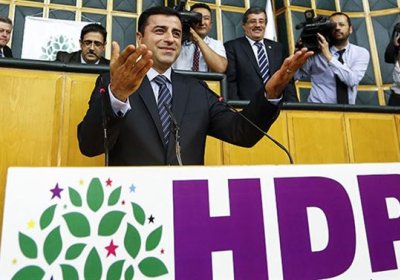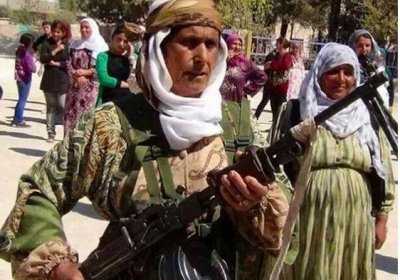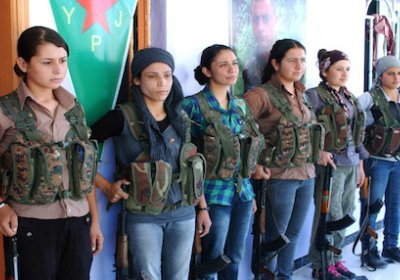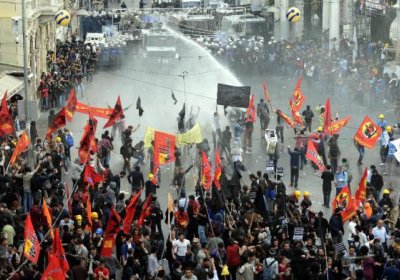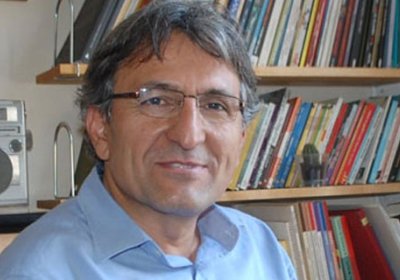The statement below was released by the foreign affairs committe of the Turkish left-wing People's Democratic Party (HDP) on October 3. The HDP is a strong support of Kurdish rights. HDP presidential candidate, Kurdish activist Selahattin Demirtas, won almost 10% o0f the vote in Turkey's presidential elections in August. The statement is reprinted from HDPEnglish.wordpress.com and has been edited for clarity.
***
Turkey
With the US and allied nations, including Arab countries, carrying out air strikes in Syria, the Turkish government is trying to convince the West it does not support the Islamic State (IS) forces the US is targetting.
Newly elected President Recep Tayyip Erdogan (the former prime minster) linked the adjective “terrorist” with “IS” for the very first time on September 23 during a US TV interview while attending the United Nations climate summit.
“Turkey will do whatever needs to be done to stop this terrorist organisation, militarily, and politically,” he said.
Besieged since September 15, the northern Syrian Kurdish-majority city of Kobane (whose Arabic name is Ayn al-Arab) has mounted a heroic, all-out resistance to the murderous Islamic State gangs.
As of September 25, despite the superior heavy weaponry deployed by the IS, it appears that fierce resistance and determined counter-attacks have halted or slowed the assault. Nonetheless, the IS has pushed closer to the city centre than ever before and the situation remains perilous.
The Kurdish people are facing an unprecedented challenge. Across a vast swathe of northern Syria and Iraq, the region’s Kurds are locked in a desperate and heroic struggle with the genocidal forces of the so-called Islamic State (IS).
Fighting is raging across a huge front hundreds of kilometres wide, from Aleppo and Kobane in Syria to Mosul and Kirkuk in Iraq — and all points in between.
“The Gezi Resistance is the biggest popular uprising in modern Turkish history,” said long-time socialist activist Nuray Sancar. “It smashed the fear we have been living with since the military coup in 1980.”
It has now been a year since the Gezi Resistance started with a handful of people protecting trees in Gezi Park in Istanbul's Taksim Square in June last year. Protests spread to 79 cities across Turkey in the next few months.
People in Turkey are sad and angry.
At least 300 workers lost their lives in a May 13 mine accident in Soma, a small town 300 miles from Istanbul. It was the biggest workplace disaster in Turkish history.
But instead of punishing management and promising to improve safety, Prime Minister Recep Tayyip Erdogan has openly defended the company.
All across the country, people are mobilising against the government. The ruling Justice and Development Party (AKP) has reacted with police violence, pepper gas, and water cannons.
The day after the horrific May 14 mine tragedy in Soma in Turkey, people gathered in Union Square in New York to show support to the miners and condemn the conditions the workers faced.
On May 13, at 3pm, Turkey witnessed one of the biggest workplace murders in its history. After a huge explosion, more than 700 mine workers were trapped in Soma Coal, a private lignite mine in Soma, in the western province of Manisa.
The Justice and Development Party (AKP) government has tried to minimise the death toll, while deploying hundreds of soldiers and police officers to the town and the miners’ village of Eynes to head off possible unrest.
Violence broke out in the mining town of Soma on May 14 when embattled Turkish Prime Minister Recep Erdogan made an emergency visit after a huge explosion at nearby mines.
Erdogan’s attempted speech was met with shouts of “murderer” and rock throwing as police plucked people out of the crowd in an effort to maintain order.
In the capital, Ankara, police fired tear gas at up to 800 protesters, who hurled stones and petrol bombs back and shouted anti-government slogans as they tried to march to the energy ministry.
Cracks have been deepening in Turkey's new religious ruling class since the Gezi uprising in May last year. There is now an open and brutal war between two governing factions. This will likely escalate after the local government elections on March 30.
Followers of Turkey’s best-known cleric and moral didact, Fetullah Gulen, have been encouraged for decades to work within Turkey's government and have accrued much power.
Ender Imrek is a member of the Taksim Platform, the key organising centre during the Gezi Park protests. He is also former vice-president of the revolutionary socialist party Labour Party-Turkey (EMEP) and a central executive member of left-wing umbrella group the People’s Democratic Congress (HDK).
The HDK played a key role during the Gezi protests, when police brutally evicted protesters seeking to stop the destruction of trees in Taksim Gezi Park in May. He spoke to Green Left Weekly's I. Zekeriya Ayman
* * *
Can you tell us about the HDK?
The capacity of the Turkish revolutionary left to help lead a mass revolt has been tested during the past month of the Gezi protests.
They are now calling it “the Great June Resistance”. The left clearly feel lighter, refreshed. Their spirit is higher than it has been for decades. And most importantly, they have a direction to grasp. The path forward is clear.
A united people’s struggle for revolution has been the dream of Turkey's left for more than four decades. Finally they have experienced a real united mass peoples movement.
- Previous page
- Page 23
- Next page

